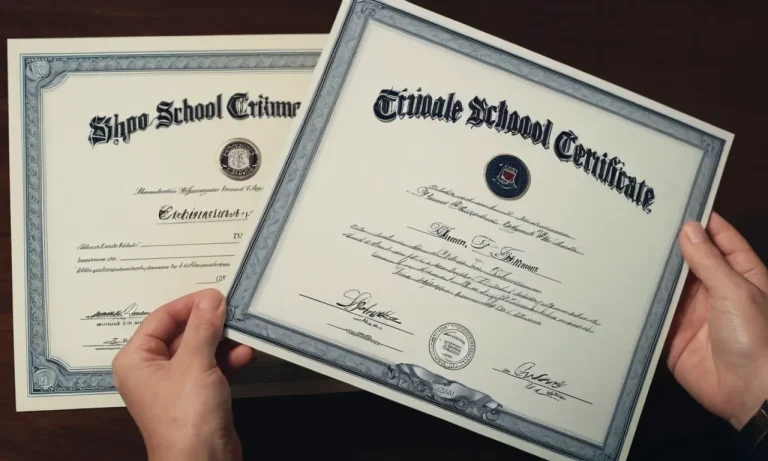In an ever-evolving world, the traditional education system often falls short in equipping students with the essential skills and knowledge they need to thrive. As society progresses, it becomes increasingly crucial to reevaluate the curriculum and incorporate subjects that better prepare individuals for the challenges and opportunities of the modern era.
If you’re short on time, here’s a quick answer to your question: Schools should teach practical life skills, financial literacy, mental health awareness, critical thinking, and digital literacy alongside traditional academic subjects to better prepare students for the real world.
In this comprehensive article, we will delve into the various subjects and topics that should be taught in schools to ensure a well-rounded education. From practical life skills to financial literacy, mental health awareness, critical thinking, and digital literacy, we will explore the importance of each subject and how they can contribute to the overall development and success of students.
Practical Life Skills
Schools have traditionally focused on academic subjects like math, science, and literature, but there’s a growing recognition that practical life skills are just as essential for students to thrive in the real world.
These skills encompass a wide range of areas, from cooking and nutrition to household management, basic repairs and maintenance, and time management and organization. By incorporating these topics into the curriculum, schools can better prepare students for the challenges and responsibilities of adulthood.
Cooking and Nutrition
Learning to cook and understand the principles of nutrition is a vital life skill that can have a profound impact on one’s health and well-being. Unfortunately, many students graduate without a basic understanding of how to prepare healthy meals or read nutrition labels.
By teaching cooking classes and incorporating nutrition education into the curriculum, schools can empower students to make informed choices about their diet and develop healthy eating habits that will serve them for a lifetime.
According to the Academy of Nutrition and Dietetics, proper nutrition can help prevent chronic diseases like obesity, heart disease, and type 2 diabetes. Additionally, studies have shown that students who learn about nutrition and cooking are more likely to make healthier food choices and maintain a balanced diet 😊.
Household Management
Managing a household is a complex task that involves a range of skills, from budgeting and financial literacy to cleaning, laundry, and organization. Unfortunately, many students leave school without a basic understanding of these essential life skills.
By incorporating household management into the curriculum, schools can better prepare students for the realities of independent living.
- Budgeting and Financial Literacy: Students should learn how to create and stick to a budget, manage their finances, and understand concepts like credit scores and interest rates.
- Cleaning and Laundry: Basic cleaning techniques, proper use of cleaning products, and laundry skills (sorting, washing, drying, and folding clothes) are essential for maintaining a tidy and hygienic living space.
- Organization: Time management, decluttering, and organizational strategies can help students stay on top of their responsibilities and maintain a sense of order in their living spaces.
By teaching these skills, schools can help students develop the confidence and competence needed to successfully navigate the challenges of independent living.
Basic Repairs and Maintenance
From changing a lightbulb to unclogging a drain, basic repair and maintenance skills are invaluable for homeowners and renters alike. Yet, many students leave school without a basic understanding of how to perform simple household tasks or maintain their living spaces.
By incorporating these skills into the curriculum, schools can better prepare students for the realities of independent living and potentially save them significant time and money in the long run.
According to HomeAdvisor, the average cost of hiring a professional for basic home repairs can range from $100 to $500 or more, depending on the task. By teaching students how to perform these tasks themselves, schools can help them save money and develop a sense of self-sufficiency and pride in their ability to maintain their living spaces.
Time Management and Organization
In today’s fast-paced world, effective time management and organizational skills are essential for success in both academic and professional settings. Unfortunately, many students struggle with these skills, leading to stress, procrastination, and missed deadlines.
By incorporating time management and organization strategies into the curriculum, schools can better prepare students for the demands of higher education and the workforce.
According to a study by Microsoft, the average person spends over 60% of their workday multitasking, which can lead to a significant decrease in productivity and focus. By teaching students techniques like the Pomodoro method, prioritization, and task batching, schools can help them develop the skills needed to manage their time effectively and stay organized in the face of competing demands.
Financial Literacy
One of the most crucial life skills that should be taught in schools is financial literacy. Managing money effectively is a fundamental aspect of adulthood, yet many people struggle with it due to a lack of proper education.
By introducing financial literacy courses at an early age, students can develop a solid foundation for making informed financial decisions throughout their lives.
Budgeting and Saving
Understanding the importance of budgeting and saving is a cornerstone of financial literacy. Students should learn how to create and maintain a budget, track their expenses, and allocate funds appropriately.
This knowledge can help them develop healthy financial habits from a young age, such as saving for emergencies, short-term goals, and long-term aspirations like higher education or homeownership. According to a study by the FINRA Investor Education Foundation, individuals who had received financial education were more likely to have a budget and emergency savings.
Investing and Retirement Planning
Investing and retirement planning are often overlooked topics in traditional education systems. However, introducing these concepts early on can empower students to make smart choices about their financial futures.
They should learn about different investment vehicles, such as stocks, bonds, and mutual funds, as well as the power of compound interest and the importance of starting to save for retirement as early as possible.
According to a survey by Bankrate, only 23% of Americans have enough saved for retirement, highlighting the need for better education in this area.
Credit and Debt Management
Understanding credit and debt management is crucial in today’s world, where credit cards and loans are widely accessible. Students should learn about the responsible use of credit, the consequences of mismanaging debt, and strategies for building and maintaining a good credit score.
This knowledge can help them avoid the pitfalls of excessive debt and equip them with the tools to make informed decisions when it comes to borrowing money. According to a study by Urban Institute, individuals with higher student loan debt tend to have lower credit scores, emphasizing the importance of debt management education.
Taxes and Personal Finance
Understanding taxes and personal finance is essential for navigating the complexities of the financial world. Students should learn about different types of taxes (income tax, sales tax, property tax, etc. ), how to file tax returns, and the implications of tax planning.
Additionally, they should be educated on topics such as insurance, estate planning, and personal finance management tools like budgeting apps and online banking. According to a survey by National Foundation for Credit Counseling, 58% of respondents admitted to not having a budget, highlighting the need for better personal finance education.
By incorporating financial literacy into the curriculum, schools can equip students with the knowledge and skills necessary to make informed financial decisions throughout their lives. This education can empower them to achieve financial stability, build wealth, and secure a prosperous future.
It’s time to prioritize financial literacy as a core component of education, ensuring that every student has the tools to navigate the complex world of personal finance with confidence. 😊
Mental Health Awareness
In today’s fast-paced world, mental health has become a critical issue that often gets overlooked. Schools play a pivotal role in shaping young minds, and it’s essential to incorporate mental health awareness into the curriculum.
By doing so, we can equip students with the necessary tools to navigate the challenges of life and promote overall well-being.
Stress Management Techniques
Stress is an inevitable part of life, and students are particularly vulnerable to its effects. Teaching stress management techniques, such as deep breathing exercises, mindfulness practices, and time management skills, can help students cope with academic pressures and maintain a healthy work-life balance.
According to a study by the American Psychological Association, 💡 mindfulness-based interventions have been shown to reduce stress, anxiety, and depression in students.
Emotional Intelligence
Emotional intelligence (EQ) is the ability to recognize, understand, and manage one’s emotions and those of others. By developing EQ, students can build stronger relationships, communicate more effectively, and make better decisions.
Schools can incorporate emotional intelligence training through role-playing activities, group discussions, and self-reflection exercises. 😊 A study by the Collaborative for Academic, Social, and Emotional Learning found that students with higher EQ had better academic performance, better social behavior, and lower levels of stress.
Recognizing and Addressing Mental Health Issues
Mental health issues, such as depression, anxiety, and eating disorders, are prevalent among students. Providing education on recognizing the signs and symptoms of these conditions can empower students to seek help and support when needed. Schools should also have a robust support system in place, including counselors, psychologists, and referral resources, to ensure that students receive the care they need.
According to the National Alliance on Mental Illness, early intervention and treatment can significantly improve outcomes for individuals with mental health conditions.
Promoting Healthy Coping Mechanisms
In addition to addressing mental health issues, it’s crucial to teach students healthy coping mechanisms. This can include activities like journaling, art therapy, physical exercise, and engaging in hobbies or interests.
By exploring different coping strategies, students can find what works best for them and develop a toolkit for managing stress and difficult emotions in a positive way. 👏 The National Institute of Mental Health recommends incorporating self-care practices into daily routines to promote overall mental well-being.
By prioritizing mental health awareness in schools, we can create a more supportive and inclusive environment for students. It’s an investment in their future, equipping them with the skills and knowledge to navigate life’s challenges with resilience and confidence. 🎉
Critical Thinking and Problem-Solving
In today’s rapidly evolving world, the ability to think critically and solve problems is more crucial than ever before. Schools should prioritize teaching these essential skills to equip students with the tools they need to navigate complex challenges and thrive in their personal and professional lives.
Let’s delve deeper into the importance of critical thinking and problem-solving, and why they should be an integral part of the curriculum.
Analytical and Logical Reasoning
Analytical and logical reasoning skills enable individuals to break down complex problems into manageable components, evaluate information objectively, and draw well-reasoned conclusions. By teaching students these skills, they can learn to identify patterns, recognize biases, and make informed decisions based on evidence.
According to a study by the American Psychological Association, strong analytical reasoning abilities are linked to higher academic achievement and better problem-solving capabilities.
Creative Problem-Solving
While analytical thinking is crucial, creative problem-solving is equally important. In an ever-changing world, students need to learn how to approach challenges from unique perspectives and develop innovative solutions.
Schools should foster an environment that encourages creativity, divergent thinking, and the ability to connect seemingly unrelated ideas. A study by Science Direct found that individuals with strong creative problem-solving skills are more likely to succeed in entrepreneurial endeavors and adapt to changing circumstances.
Decision-Making Skills
Making informed decisions is a critical life skill that impacts every aspect of our lives. By teaching decision-making skills, schools can help students learn to weigh pros and cons, consider multiple perspectives, and anticipate potential consequences.
This not only prepares them for academic challenges but also equips them with the tools to navigate personal and professional decisions effectively. According to a report by the OECD, strong decision-making skills are linked to better life outcomes and increased well-being.
Effective Communication and Collaboration
In our interconnected world, the ability to communicate effectively and collaborate with others is essential. Schools should teach students how to express their ideas clearly, listen actively, and work together towards common goals.
By fostering these skills, students can learn to navigate diverse perspectives, leverage collective knowledge, and achieve greater success through teamwork. A study by Taylor & Francis Online found that effective communication and collaboration skills are highly valued by employers and contribute significantly to workplace success.
By incorporating critical thinking and problem-solving into the curriculum, schools can empower students with the tools they need to tackle complex challenges, adapt to change, and thrive in an ever-evolving world.
Investing in these essential skills not only benefits individuals but also contributes to the development of a more innovative, resilient, and collaborative society. 😊👏
Digital Literacy
In today’s digital age, it’s crucial for students to develop a comprehensive understanding of digital literacy. This encompasses a wide range of skills and knowledge, from online safety and cybersecurity to responsible social media usage, digital productivity tools, and even coding and programming basics.
Let’s delve into each of these essential aspects:
Online Safety and Cybersecurity
With the increasing reliance on digital platforms and the internet, online safety and cybersecurity have become paramount concerns. According to a Pew Research Center study, nearly 60% of Americans have experienced some form of online harassment or abuse.
Schools should educate students on identifying and mitigating online risks, such as phishing scams, identity theft, and cyberbullying. Practical tips on creating strong passwords, recognizing suspicious links or emails, and protecting personal information should be emphasized.
Responsible Social Media Usage
Social media has become an integral part of modern communication, but its misuse can have far-reaching consequences. Schools should teach students the importance of responsible social media usage, including maintaining privacy, avoiding oversharing personal information, and understanding the potential impact of their online activities on their digital footprint and future prospects.
Additionally, students should learn about the dangers of cyberbullying, misinformation, and the importance of digital citizenship.
Digital Productivity Tools
In an era where remote work and online collaboration are becoming increasingly prevalent, proficiency in digital productivity tools is essential. Students should be introduced to a wide range of tools, such as:
- Cloud storage and file-sharing platforms (e.g., Google Drive, Dropbox)
- Online office suites (e.g., Google Workspace, Microsoft Office 365)
- Project management and team collaboration tools (e.g., Trello, Asana)
- Video conferencing software (e.g., Zoom, Microsoft Teams)
Mastering these tools will not only enhance their productivity but also prepare them for the digital workplace of the future.
Coding and Programming Basics
In the digital age, coding and programming skills are becoming increasingly valuable across various industries. While not everyone needs to become a software engineer, introducing students to coding and programming basics can foster logical thinking, problem-solving abilities, and a deeper understanding of how technology works.
😊 Schools could offer introductory courses in languages like Python, JavaScript, or even visual programming tools like Scratch, empowering students to create their own digital projects and explore the world of technology hands-on.
By incorporating these essential digital literacy components into the curriculum, schools can equip students with the knowledge and skills necessary to navigate the digital world safely, responsibly, and productively.
Ultimately, this will prepare them for success in an increasingly technology-driven society. 🎉
Conclusion
In conclusion, incorporating subjects like practical life skills, financial literacy, mental health awareness, critical thinking, and digital literacy into the school curriculum is essential for preparing students for the challenges and opportunities of the modern world.
By equipping them with these valuable skills and knowledge, we can empower them to navigate life’s complexities, make informed decisions, and contribute positively to society.
Ultimately, education should not be limited to traditional academic subjects but should encompass a holistic approach that fosters personal growth, practical competencies, and a well-rounded understanding of the world.
By embracing these subjects in schools, we can ensure that students are better equipped to thrive in their personal and professional lives, and become responsible, resilient, and adaptable individuals.






